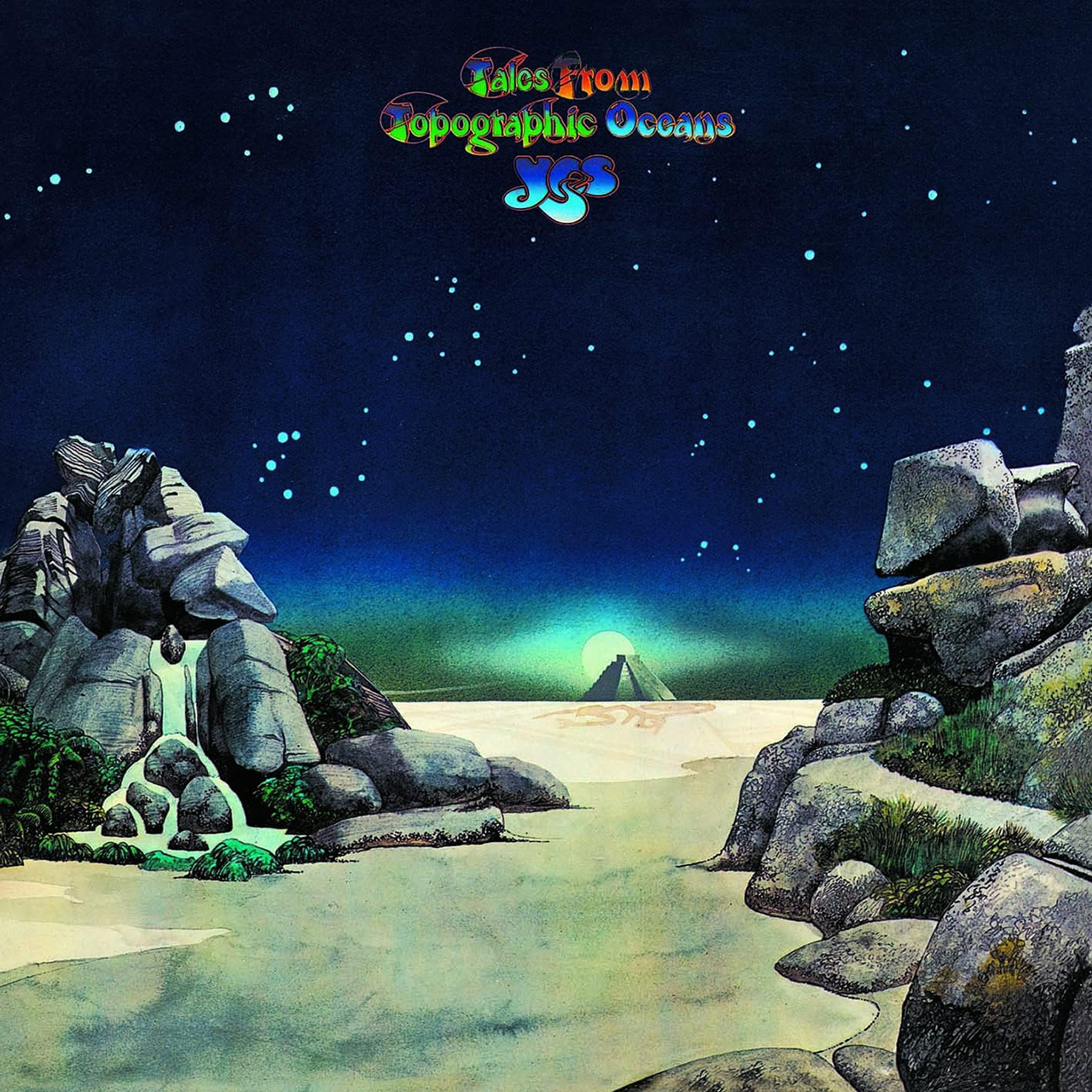“It’s the moment the cracks appeared and their decline into preposterousness began. It sinks under the weight of its own self-importance”: What members of Marillion, Dream Theater, Asia and more think of Yes’ Tales From Topographic Oceans
It was the double-album that split critics, fans and the line-up who recorded it. We asked a range of prog stars for their thoughts on the 1973 release

Select the newsletters you’d like to receive. Then, add your email to sign up.
You are now subscribed
Your newsletter sign-up was successful
Want to add more newsletters?

Every Friday
Louder
Louder’s weekly newsletter is jam-packed with the team’s personal highlights from the last seven days, including features, breaking news, reviews and tons of juicy exclusives from the world of alternative music.

Every Friday
Classic Rock
The Classic Rock newsletter is an essential read for the discerning rock fan. Every week we bring you the news, reviews and the very best features and interviews from our extensive archive. Written by rock fans for rock fans.

Every Friday
Metal Hammer
For the last four decades Metal Hammer has been the world’s greatest metal magazine. Created by metalheads for metalheads, ‘Hammer takes you behind the scenes, closer to the action, and nearer to the bands that you love the most.

Every Friday
Prog
The Prog newsletter brings you the very best of Prog Magazine and our website, every Friday. We'll deliver you the very latest news from the Prog universe, informative features and archive material from Prog’s impressive vault.
In 1973 Yes launched their sixth studio album, Tales From Topographic Oceans. It contained just four songs, each taking up a full side of the double-vinyl release; and not only did it divide fans and critics – it divided the band, leading to Rick Wakeman’s departure. Following the announcement of a 15-disc super deluxe edition arriving in February 2026, Prog looks back to 2016 when we asked members of Marillion, Dream Theater, Asia and others what they really thought of the album, discovering a range of differing opinions.
Steve Hackett
I know this was an album that divided opinion when it was first released, but I liked it at the time, and still do. I recall Chris Squire telling me that the band did no more than a few bars of music a day. It meant they could perfect what they had, and explains why Tales sounds so highly detailed.
“I know it was Jon Anderson’s concept, but you can tell from the way everyone got involved instrumentally that all of Yes were at a peak. And here we are, still talking about it. That proves that whether you love or hate it, this album has made a lasting impact.
John Mitchell (Lonely Robot, Asia)
Yes have been one of my enduring favourite bands since I accidentally bought an album aged 14 when I mistakenly took the guitarist to be shredder extreme Greg Howe and not Steve Howe. An odd way to get into a band, you might think – but my love for them hasn’t diminished since that first encounter.
That said, as with most bands they’ve made good albums and not so good albums. Tales was perhaps the moment the cracks started to show, and their decline into the preposterousness of progressive rock began. A tenuous concept to begin with, based on a book of Hindu teachings, stretched into four songs over four sides of a double album does not make for particularly enjoyable listening experience.

It’s not a bad album, but it sinks under the weight of its own bloated self-importance, and that’s coming from a Yes devotee! Apart from The Revealing Science Of God – which has some moments of genuine beauty – it’s held together with more filler than a Triumph Spitfire. I suppose I should feel more affection for an album written on the year of my birth, but I’m afraid I don’t. Stick with Close To The Edge!”
Nick Beggs (Steven Wilson, The Mute Gods)
This is my favourite Yes album. But over the years it’s come in for a massive amount of public vilification. And to all those naysayers I would just say this: Get your ears syringed! Tales From Topographic Oceans is an amazing musical journey with few rivals in the genre.
Sign up below to get the latest from Prog, plus exclusive special offers, direct to your inbox!
Theo Travis (Soft Machine, Gong)
It was never my favourite Yes record. Steven Wilson has spun his usual magic on the new remix, but I still find the music a little overblown and ponderous. Lots of people are coming out of the closet saying, “Actually, it was always my favourite Yes album” – but I’m more excited at the prospect of a remix/reissue (and re-evaluation!) of Time And A Word . That’s a much crisper album buzzing with fire, edge, joy and great songs.
Mike Portnoy (Dream Theater)
When Transatlantic did a special set of Yes songs with Jon Anderson on my Progressive Nation At Sea 2014 Cruise, little did we realise what we were getting ourselves into! Jon had told me he wanted to “keep it simple” – then a few days later he said he had an idea for Side One of Topographic Oceans. Talk about jumping off the deep end!
Of course, we were thrilled at the idea and challenge. But once we began rehearsing the material at soundchecks each day, we realised how complex the music was. All of us were more than capable of playing the parts, but the composition was so unbelievably unorthodox and complex.
I can honestly say that learning The Revealing Science Of God was the biggest challenge I’ve ever had! I cannot imagine how this music was composed. It’s almost like, “OK, do this 5/4 riff 11 times and then do this 9/8 jungle groove five times and then let’s do 13 vocal stabs into a keyboard solo and then drop into an acapella vocal part in free time….” There was no way to remember these twists and turns unless you’d written it.
But once we began rehearsing with Jon, he was conducting the transitions and the tempo changes, and suddenly it all made sense. I always wondered how his musical contributions fit into the equation of the virtuoso musicianship in Yes, and I was able to see he was the centre of it all. He was the glue that held these four incredible musicians together.
Tim Bowness
I’ll always choose Close To The Edge and Going For The One as the creative pinnacles of Yes music. But I’ve always had a soft spot for Tales From Topographic Oceans, and it’s probably been more influential to me in its own barmy way than anything else the band have done.
It was an amazingly brave and bloody-minded release, that has to be one of the strangest number one albums in history. The Revealing Science Of God is a brilliant and logical follow-on from Close To The Edge, while the future-primitive tribal assault of the first half of The Ancient and the timeless beauty of the Nous Sommes Du Soleil section of Ritual rank with the band’s best work for me.
If one has the patience, there are so many memorable catchy melodies and melodic sections
Jordan Rudess
“I’ve always been drawn to the stories surrounding the album’s making, from the plastic cows and straw in the studio to Rick Wakeman downing pints and playing darts with Black Sabbath as Anderson and Howe sought enlightenment via their spiritual compositions.
Topographic Oceans is indulgent, overlong and the sound of a band overreaching its (considerable) abilities; but music would be poorer without it. A tighter three track album featuring an edited Revealing Science Of God, part one of The Ancient and a more fleshed out Nous Sommes Du Soleil may well have been artistically and commercially preferable, but I love the fact that Yes got carried away by a big idea and ended up in a wholly unrecognisable place – a level pure excess, on another a triumph of unfettered imagination.
Jordan Rudess (Dream Theater)
It was a very free-spirited album. In the grand old days of prog, especially with Yes, there was a wisdom and comfort in everything they brought to us. Even within its wandering nature, it’s a beautiful release; and if one has the patience, there are so many memorable catchy melodies and melodic sections. The sounds themselves – like the classic Mini Moog synthesiser from Wakeman, Anderson’s golden voice and Howe’s signature guitar – all shine through. This is an album that could only have existed in 1973, when the world was a much different place!
Mark Kelly (Marillion)
It’s one of those albums that shouldn’t have been a double. Side One was really good. Side Two was good. Side Three was terrible. Side Four was a bit better. I still play the first two sides when I go out running.
Roine Stolt (The Flower Kings, Transatlantic)
Besides having one of the most iconic album covers, it features some of the most daring prog rock ever recorded, and one of the coolest album titles.
The blend of simple folky songs, symphonic bliss, improvised electronica and odd time signatures, plus fabulous lyrics, all make it stand out. I bought it in 1973, convinced that Yes were the thing after Close To The Edge. I played it to pieces, sometimes twice a day. The sheer inventiveness from Anderson and Howe is a grand landmark in Yes history – and in prog generally. All the members shine, even if sometimes in a more silent way.
When I got to play Side One of this album live onstage with Jon a couple of years back, it was surreal. I still have my vinyl copy and a handful of remasters and Japanese pressings. Topographic Oceans is the spiritual axis where I wanna take every music project.
Sid's feature articles and reviews have appeared in numerous publications including Prog, Classic Rock, Record Collector, Q, Mojo and Uncut. A full-time freelance writer with hundreds of sleevenotes and essays for both indie and major record labels to his credit, his book, In The Court Of King Crimson, an acclaimed biography of King Crimson, was substantially revised and expanded in 2019 to coincide with the band’s 50th Anniversary. Alongside appearances on radio and TV, he has lectured on jazz and progressive music in the UK and Europe.
A resident of Whitley Bay in north-east England, he spends far too much time posting photographs of LPs he's listening to on Twitter and Facebook.
You must confirm your public display name before commenting
Please logout and then login again, you will then be prompted to enter your display name.

